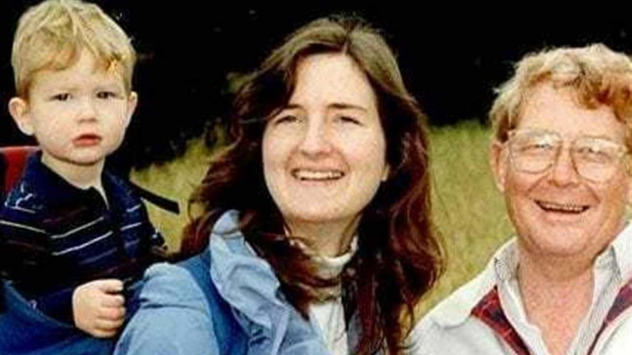
Sei sicuro di voler sbloccare questo articolo?

The documentary film about the American child, victim of a murder at the age of seven on the A3 Salerno-Reggio Calabria highway while he was headed to Sicily during a trip to Italy with his family, is back in fashion thanks to a project by Carmen Vogani and Lorenzo Avola. It's been 30 years since then.

The documentary film about the American child, victim of a murder at the age of seven on the A3 Salerno-Reggio Calabria highway while he was headed to Sicily during a trip to Italy with his family, is back in fashion thanks to a project by Carmen Vogani and Lorenzo Avola. It's been 30 years since then.
‘The Nicholas Effect’ - explains Carmen Vogani, brilliant author together with Lorenzo Avola of the program that will be broadcast on Friday in prime time on RAI2 - is a choice of field”.
-Carmen, why do you speak of a “choice of field”?
“Because ours is a documentary that promotes the culture of organ donation by telling an iconic story that moved Italy, but above all questioned us as citizens on the topic of donation”:
- In what sense do you say that?
“Thirty years ago, when Nicholas was killed, Italy was at the bottom of the list in terms of number of consents to donation. Then there was a cultural revolution. Thanks to Nicholas’ parents, Reginald and Margaret, who passed on a lesson in generosity to our country, and also thanks to television that acted as a sounding board”.
- Carmen, can I ask you how this project of yours was born?
“I chose it because this story concerns me personally. A year after Nicholas, in 1995, my father had a heart transplant. I was a child who spent a lot of time in front of the television, and I remember the reports that RAI Calabria broadcast on all the networks in those days. There wasn’t just the story of the tragedy of little Nicholas, there was also, and I would say loud and clear, the story of the rebirth of transplant recipients.
-Beautiful what you say…
“Let’s say that thirty years later I wanted to do my part, in the hope of inspiring those “Yes” to the donation that by saving a person’s life, save entire families”.
-A film born by chance, can we say that?
“It all started with an occasion: the Green couple’s return to Italy, thirty years after Nicholas’ death. The documentary has this horizontal line that is precisely the journey from California to our country and vice versa, everything happens under our cameras that move between the public and private dimensions of these two extraordinary parents. Nicholas’ story - the murder, the trial, the choice to donate his organs - is intertwined with the history of transplants, with the testimonies of today’s donors and recipients. Because the “Nicholas effect” has a long tail”.
-A complex film, I imagine?
“I’ll start with what was most difficult: balancing the moving aspect of this story with the need to inform, normalizing the story of transplants with rigorous but warm language. The simplest thing was the relationship with the interviewees, they were all aware of the value of this story”.
-Do I detect a lot of emotion in you?
“We had already studied the story, we started directly from the choice of interviewees. We identified some from the Rai archives, others through the memories of the Green family, they are all central figures. From the early stages we collaborated with the National Transplant Center and its director, Dr. Giuseppe Feltrin, to have direct sources on the topic”.
-Do you want to say thank you to someone?
“I conceived and created the documentary together with the author Lorenzo Avola, with the direction of Edoardo Anselmi and the editing of Simone Mele, but it was truly a team effort. Like in the movies, no one should turn the lights back on before the last name has appeared in the credits. If you remove even just one of those names, the foundations of the documentary collapse. The ideas do not belong to those who had them, they belong to those who made them walk on their own legs”.
-Prime time on RAI2, does it seem like a great success for you and your team?
“The state of health of documentaries in Italy is, how can I say, sickly. Little investment, even less space. When I proposed the documentary to producers Leonardo Pasquinelli and Francesco Pincelli of Endemol Shine Italy, it was immediately: “Let’s do it!”. Rai Documentari believed in it with the same enthusiasm. It is not so obvious that imagined stories take shape. You see? The principle that ideas are not enough comes back. You need vision and investment. I think I found myself in the right place at the right time, and I am grateful. Deeply grateful”.
-If you had to tell your story, how would you do it?
“Half my life in the province of Reggio Calabria, the other half in Rome. As a journalist I started writing news for the historic newspaper Paese Sera, then I chose my first true great love: television. At Rai2, with the program ‘Nemo. Nessuno Escluso’, I experimented with the language of docu. Experience of the heart: ‘Tu non sai chi sono io’ (Raiplay), a series about teenagers. From there the path of documentaries, many produced for Warner Bros Discovery (‘Mafia connection’ and ‘Il Celeste’, some of the titles)”.
-Today Carmen Vogani returns to Rai2 with ‘Effetto Nicholas’ produced by Endemol Shine Italy. Future projects?
“Future projects “top secret” by contract, but it can be said that the path of documentaries continues, and that I have cast an eye on cinema. Today I write for the magazine ‘Donne Chiesa Mondo’. In my free time, I am also an anti-mafia activist for the Association daSud of which I am vice president”.
-Good luck then.
“Long live the wolf”.